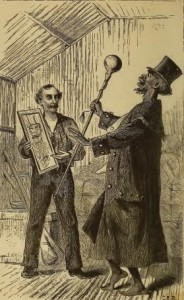Electrocuting African Tribal Hosts January 3, 2012
Author: Beach Combing | in : Modern , trackbackOne of the great challenges of any nineteenth-century explorers was to make friends with the ‘primitives’ in such out of the way places as an equatorial rain forest, the upper peaks of the Andes and through much of Darkest Africa. And, of course, to do so they brought gifts along with them: a sensible enough precaution. And what gifts! Here is a list from one African-bound American at the end of the nineteenth-century. The following were an addendum to his goods as things that, though useless in themselves, he could give to the natives to add to his prestige and power over them.
I bought more than 5000 pounds of beads of different sizes and colors, several hundred pieces of cotton goods, some pieces of silk and coats, waistcoats, shirts, 2000 red caps, a few umbrellas, files, knives, bells, fire-steels, flints, looking-glasses, forks, spoons, some stove-pipe hats for the kings near the sea-shore, straw hats, etc., etc. Then, to impress the wild people with what I could do, I bought several large Geneva musical boxes, one powerful electrical battery, several magnets, and six ship clocks, etc, etc.
Two items stand out for Beachcombing on this list. The stove pipe hats – see illustration – and the ‘powerful electric battery’. WtH! Let us imagine for a moment that you have just accidentally trod on the sore toe of a powerful up-river chieftain. How is a ‘powerful electric battery’ going to save your life? Well, read this passage and remember that our hero has already intimidated his hosts with gunfire and – the darkness! – Swiss music boxes.
After a few moments I took the [music] box back into my hut, and brought out a powerful electric battery. Then I ordered the forty-three elders and the king to come and stand in a line. They came, but were evidently awed. The people dared not say a word. Every thing being ready, I told them to hold the ninety feet of conducting wire. ‘Hold hard!’ I cried. The people looked at the old men with wonder, and could not understand how they dared to hold that charmed string of the Oguizi [a white]. The Ishogos, my guides, were themselves bewildered, for they had not seen this thing in their village. My Commi men did not utter a word, but their faces were as long as if they never had seen anything. ‘Hold on!’ I repeated, ‘do not let the string go out of your hands’. I then gave a powerful continuous shock. The arms of the elders twisted backward against their will, and their bodies bent over; but they still held the wire, which, indeed, now they had not the power to drop. Their mouths were wide open; their bodies trembled from the continuous electric shock; they looked at me and cried ‘Oh! oh! oh! Yo! yo! yo!’ I had really given a too powerful shock. The people fled. In an instant all was over. I stopped the current of electricity. The wire fell from the elders’ hands, and they looked at me in perfect bewilderment. The people came back. The elders explained their electric sensation, and then a wild hurra and a shout went up. ‘There is not another great oguizi like the one in our village,’ was the general exclamation ; and they came and danced around me, and sang mbuiti songs, bending their bodies low, and looking at me in the face as if I had been one of their idols.
He then proceeds to terrify the villagers with a deftly used magnet…
Any other ‘superiority’ gifts? Drbeachcombing AT yahoo DOT com
***
5 Jan 2012: Sword&Beast writes in ‘I´ve just read your post on gifts from explorers and it reminded me a passage from the history of Brazil. Bartolomeu Bueno da Silva was an explorer from the 17th century then village of São Paulo, one of many who went deep inland to fetch for natives, gold or diamonds. The 1987 movie The Mission gives a good impression of these slave-hunting expeditions called ‘bandeiras‘. In 1682, Bartolomeu Bueno da Silva run into a tribe where the women were richly adorned with gold. As they refused to tell were the gold came from, the explorer threw the strong Brazilian run called “cachaça” (which today is used for milder uses such as “caipirinha”) into a pound and set it on fire, saying that he would burn all rivers and water sources if he was not taken to the gold sites. Although not as threatening as Swiss music boxes, it worked and the explorer passed into history known as Anhanguera, which means ‘old devil’ in the local amerindian language.’Thanks S&B!



